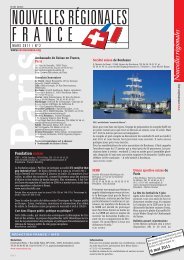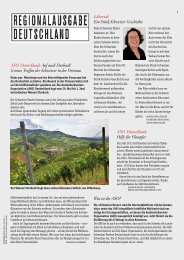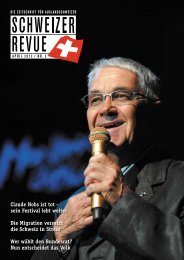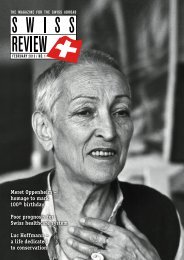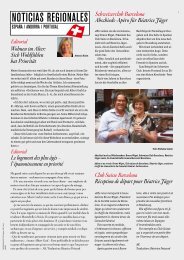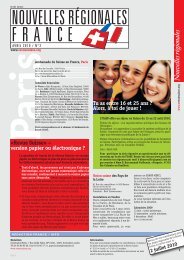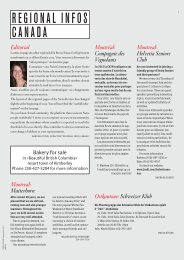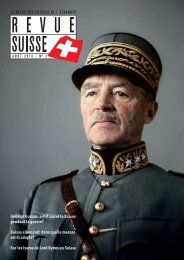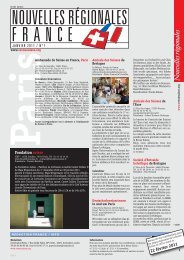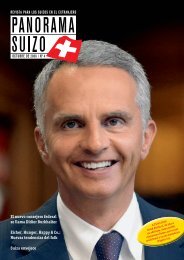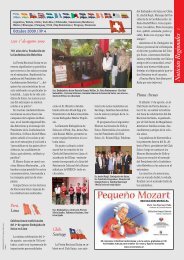Which energy will be best for Switzerland? Doris ... - Schweizer Revue
Which energy will be best for Switzerland? Doris ... - Schweizer Revue
Which energy will be best for Switzerland? Doris ... - Schweizer Revue
Create successful ePaper yourself
Turn your PDF publications into a flip-book with our unique Google optimized e-Paper software.
14<br />
OFFICIAL DFA INFORMATION<br />
SWISS REVIEW August 2006 / No. 4<br />
Translated from German<br />
New Swiss passport<br />
Model 06<br />
Readers of the 2/06 issue of<br />
“Swiss Review” <strong>will</strong> recall that<br />
Swiss passports containing<br />
electronically recorded biometric<br />
data <strong>will</strong> <strong>be</strong> issued from<br />
Septem<strong>be</strong>r onwards. Specimens<br />
of the new “06” passports<br />
are currently <strong>be</strong>ing<br />
printed <strong>for</strong> testing purposes.<br />
The first test passport offices<br />
are located in Berne and Frankfurt<br />
(Germany). Eight such offices<br />
<strong>will</strong> <strong>be</strong> set up <strong>for</strong> the duration<br />
of the pilot project to<br />
introduce the new passports in<br />
<strong>Switzerland</strong>. Eight more <strong>will</strong> <strong>be</strong><br />
set up at Swiss representations<br />
abroad. These offices <strong>will</strong> <strong>be</strong><br />
provided with special cameras<br />
that can take digital passport<br />
photographs. The location of<br />
these offices can <strong>be</strong> found in the<br />
2/06 issue of “Swiss Review”.<br />
During an initial test in<br />
Berne and Frankfurt, photographs<br />
were taken of the faces<br />
of 160 volunteers of different<br />
age and appearance. These<br />
were then combined with fictitious<br />
data and used to produce<br />
about 500 test passports. The<br />
passports were then used <strong>for</strong><br />
“chain tests” to check the effectiveness<br />
of systems and procedures.<br />
The test passports <strong>will</strong><br />
remain in federal government<br />
hands during the test phase, after<br />
which they <strong>will</strong> <strong>be</strong> destroyed.<br />
Model 06 passports <strong>will</strong> <strong>be</strong><br />
issued in parallel to current<br />
Model 03 passports from this<br />
Septem<strong>be</strong>r. Applications <strong>for</strong> the<br />
new passport can <strong>be</strong> made from<br />
4 Septem<strong>be</strong>r onwards.<br />
If you already have an 03<br />
passport or are issued one <strong>be</strong><strong>for</strong>e<br />
26 Octo<strong>be</strong>r 2006, you can<br />
continue to visit or transit the<br />
United States without a visa<br />
after this date. In other words,<br />
you do not need an electronically-readable<br />
biometric 06<br />
passport.<br />
Holders of 03 passports issued<br />
after 26 Octo<strong>be</strong>r 2006 <strong>will</strong><br />
in future require a visa to travel<br />
to the United States. Binding<br />
in<strong>for</strong>mation on travel to the<br />
USA is available from your<br />
nearest US representation. Further<br />
details can also <strong>be</strong> found<br />
at the following websites:<br />
www.unitedstatesvisas.gov<br />
www.travel.state.gov<br />
www.dhs.gov/us-visit<br />
The Federal Office of Police<br />
in Berne has published a leaflet<br />
containing the most important<br />
in<strong>for</strong>mation on the passport 06.<br />
This can <strong>be</strong> ordered at the<br />
following Internet address:<br />
www.bbl.admin.ch/<br />
bundespublikationen<br />
Order no.: “403.300.d”<br />
(the inverted commas must<br />
<strong>be</strong> entered).<br />
Further in<strong>for</strong>mation:<br />
“Swiss Review” 2/06<br />
(www.revue.ch)<br />
www.schweizerpass.ch<br />
schweizerpass@fedpol.admin.ch<br />
www.schweizerpass.ch<br />
Hotline: +41 (0)800 820 008.<br />
ORDER YOUR 2003 PASSPORT NOW!<br />
■ The Federal Council recommends holders of the old Model 85 passport<br />
– whether resident in <strong>Switzerland</strong> or abroad – to order an 03 passport<br />
now. This is also cheaper than a biometric passport: 03 passports cost<br />
CHF 120 <strong>for</strong> adults and CHF 55 <strong>for</strong> children, while the new 06 passport<br />
<strong>will</strong> cost CHF 180 <strong>for</strong> infants under the age of 3 and CHF 250 <strong>for</strong> everyone<br />
else.<br />
■ If you want to receive your 03 passport by 26 Octo<strong>be</strong>r 2006, you need<br />
to apply <strong>for</strong> it as soon as possible. Swiss nationals resident abroad<br />
should apply no later than the end of August.<br />
Swiss diplomas<br />
valid throughout<br />
EU and EFTA<br />
The Agreement on Free<br />
Movement of Persons (FMP),<br />
signed jointly by <strong>Switzerland</strong><br />
and the European Union<br />
and the European Free Trade<br />
Association, has <strong>be</strong>en in <strong>for</strong>ce<br />
since 1 June 2002. Amongst<br />
other things, it enables<br />
Swiss nationals to seek work<br />
throughout the EU and EFTA.<br />
Another condition <strong>for</strong> professional<br />
mobility is the<br />
recognition of different<br />
diplomas if the profession<br />
is regulated. The FMP there<strong>for</strong>e<br />
coordinates the bilateral<br />
recognition of diplomas<br />
and certificates <strong>be</strong>cause each<br />
country issues its own professional<br />
titles.<br />
The FMP does not cover<br />
the recognition of academic<br />
titles, a matter <strong>Switzerland</strong><br />
has subsequently resolved<br />
through bilateral agreements<br />
with neighbours France,<br />
Italy, Germany and Austria.<br />
These agreements are completely<br />
separate from the<br />
FMP.<br />
Regulated professions<br />
Professions requiring a<br />
diploma, certificate or quali<br />
fication to practise in a<br />
parti cular country are descri<strong>be</strong>d<br />
as “regulated”. Every<br />
mem<strong>be</strong>r state has its own<br />
rules on the qualifications<br />
required to practise a particular<br />
pro fession. As a result,<br />
Swiss nationals abroad need<br />
to find out if the profession<br />
they wish to practise is regulated<br />
in the country in which<br />
they want to work. If this is<br />
the case, they must apply to<br />
have their diplomas recognised.<br />
If their profession is<br />
not regulated (e.g. chef), no<br />
official recognition of their<br />
qualifications is required<br />
<strong>be</strong>cause anyone with a Swiss<br />
qualification can seek work<br />
abroad.<br />
Diploma recognition system<br />
The system <strong>for</strong> recognising<br />
diplomas within the EU<br />
and EFTA is based on three<br />
pillars:<br />
■ Sectoral directives (<strong>for</strong><br />
medical and paramedical professions<br />
and <strong>for</strong> architects)<br />
■ General directives (<strong>for</strong><br />
academic professions and<br />
those requiring an apprenticeship)<br />
■ Transitional directives<br />
(<strong>for</strong> professions in industry,<br />
trade, commerce, the service<br />
industry and the handicraft<br />
trades. These particularly<br />
take account of professional<br />
experience).<br />
Sectoral directives<br />
The EU has issued so-called<br />
sectoral directives <strong>for</strong> some<br />
professions. These apply<br />
specifically to general care<br />
nurses, dentists and vets,<br />
midwives, pharmacists, doctors<br />
and architects. In these<br />
cases, diplomas are more or<br />
less recognised automatically.<br />
If, <strong>for</strong> example, a French nurse<br />
wants to work in Geneva, the<br />
Swiss authorities merely check<br />
whether she has a French<br />
nursing diploma.<br />
The recognition of diplomas<br />
<strong>for</strong> these professions<br />
only relates to the applicant’s<br />
basic training. Special training<br />
courses – e.g. supplementary<br />
vocational training to <strong>be</strong>come<br />
an anaesthetist – must<br />
<strong>be</strong> reported (“notified”) to<br />
the European Commission<br />
by mem<strong>be</strong>r states and <strong>Switzerland</strong>.<br />
The Commission<br />
then decides whether to<br />
approve such special training.<br />
<strong>Switzerland</strong> has notified<br />
and submitted to the Commission<br />
the specialist titles<br />
awarded in <strong>Switzerland</strong>.



